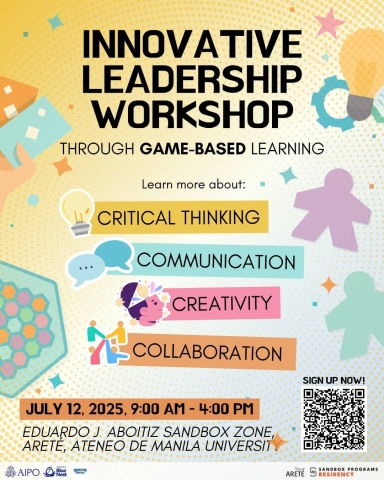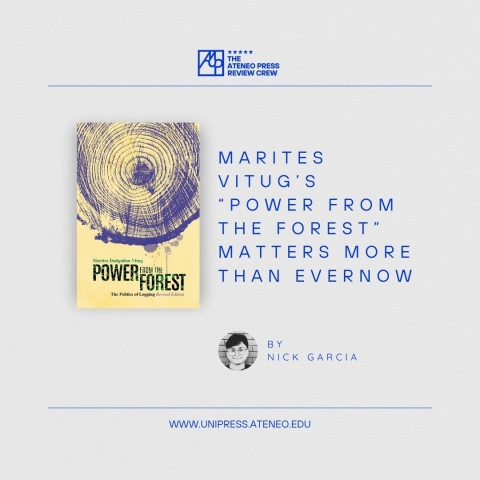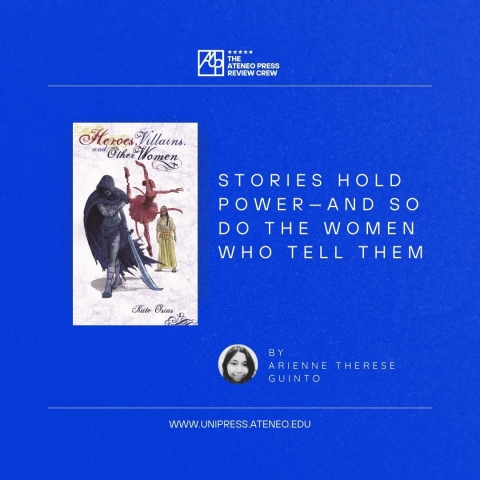[Ateneo Press Review Crew] Agency and Abandon: What the Women in "College Boy" Teach Us
29 Apr 2025 | Aylli Cortez
When one’s safety is under constant threat, it can feel natural to describe life in terms of battle—to wield your words, fight for your rights, and mentally arm yourself against those who mean to harm you. These expressions can function as empowering calls to action, but they also make us aware of the power imbalances that turn our homes, schools, and other shared settings into hostile spaces.
The women in Mookie Katigbak-Lacuesta’s College Boy (2021) know this, and are intimately familiar with the dangers that prompt us to use such a language. What fascinates me is that they choose not to rely on it. The poems in this collection are not destructive, like the predatory behaviors they critique. Rather, they are instructive—sometimes in the form of bite-sized lessons titled “Turo”, but mostly through quiet acts of observation that, mistaken for passivity, provide secret passageways in a life set to survival mode.
Katigbak-Lacuesta dwells deftly on what is vicious yet commonplace, namely the harassment and abuse that men perpetuate, through poems that are stealthy and strategic. College Boy makes us keenly aware of the invasive and violent encounters that women experience. We watch as they learn to notice everything, anticipate anything, in a bid to protect themselves. This is an active struggle. Being able to listen carefully and reassess one’s surroundings, both during and after a difficult situation, is a skill. And in this collection, it shines as a legitimate way to assert one’s agency.
In the first two sections of the book, Lakambini and Kartilya, the speakers persist by growing more and more attuned to their fears. I felt alarm and dread when I read about the seemingly “small assaults” that occurred “in the barely // perceptible touch, in / the permissible inch” (Katigbak-Lacuesta 27). But I also felt alert and ready, a powerful sensation that could have informed the poet’s decision to escalate her concerns in the poem, “Shame”:
“I was born to dodge a kiss,
slap an arm, keep from dives
past a certain hour.
I didn’t know love,
but I knew survival.
Content with the scraps,
and the rationed sugar;
[...] content with the slough. Enough.” (32)
This speaker channels her dissatisfaction into a declaration. The word “enough” announces her intolerance to the subpar standards men are held to. She also evokes images of scarcity that recall an earlier poem, one where a mother’s hoarding habits demonstrate a fear of running out, of not having enough in a world that hesitates to support women in need. Here, the speaker refuses to punish herself over how she’s made do in the past, whether she’s done enough to save herself from hurt. She won’t be ashamed to want.
The desire for companionship is a prominent theme, one that offered me relief amid the collection’s heavier poems. In “Turo (11)”, we see a longing for sisterhood and solidarity, a reminder that our dignity is shared despite our differences, for “Partner and equal / are women, all; / even frail” (Katigbak-Lacuesta 16). But desire also emerges in the book’s third section, Bright Girls, which ponders the agency of women in fiction and converses with the work of artists to envision better possibilities for our relationships.
While tercets reign in Lakambini and couplets in Kartilya, the poems in Bright Girls fluctuate between these forms. They are less clipped, more confident in how they fill the page. The speakers are no longer confined to the insides of kitchens, bedrooms, bars; they are no longer isolated or alienated in their bodies even while out in public. They talk openly, freely. In blurring their narratives with her own memories and imagination, the poet writes from multiple locales and lives, bridging the happened to the hoped-for.
And at a time when girlbosses are valorized as the height of feminism, Katigbak-Lacuesta is adamant that we recognize love as a worthy pursuit. Protecting oneself does not have to mean guarding against romance. This collection believes that we can toughen up without becoming hardened, and that being vulnerable is not an inherently weak position. There is room in these poems to love with abandon—to give oneself to pleasure in trusted company, and be held rather than hold ourselves back.
At first, I thought this posed a dilemma. I wondered: Are these poems at war, both hating and loving men? Now, I don’t think so. This book does not want us to antagonize men or shut them out of our lives completely; it wants us to challenge the disturbing desire that is encouraged among them, a lust for possession and domination that festers at the core of unhealthy masculinity.
Something sinister hovers throughout the book’s fourth section, Indang, creating a nagging sense of unease. While unsettling, it made me attentive and vigilant. I could only glimpse the offenses these speakers bore witness to, but the importance of staying awake and present was clear. In the poem “Delight”, which lends itself to multiple readings, I was moved by the speaker’s decision to walk her own path, even if that meant I was not permitted to follow.
“I’d tired of their wet talk [...]
I followed only
What I knew to be real
Smell of rain [...]
Had rooted me in time
Had said be
Here. Be neither loss
Nor hesitance,
But here” (77)
Pain and peril feature in this collection, but they do not define it. I expected this book to end with an explosion, a cathartic release of anxiety and anger. Instead, to my delight, it ends on an exhale, creating the space I needed to breathe again. Here, Katigbak-Lacuesta finds agency in an act of abandon, choosing to defuse rather than detonate.
College Boy gave me the perspective I needed to grant myself grace and let go of the compulsion to “get over” or “move past” the gender-based harm I’ve experienced. As the women in these poems teach us, there is more to life than evasion, more to confrontation than aggression. We can source strength and safety from the time we devote to ourselves and our found families, so when we face those hell-bent on diminishing us, we become neither loss nor hesistance, but remain firmly and unwaveringly here.


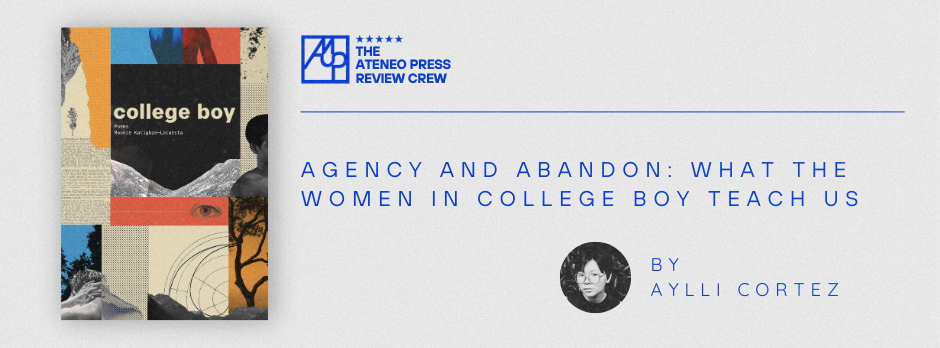

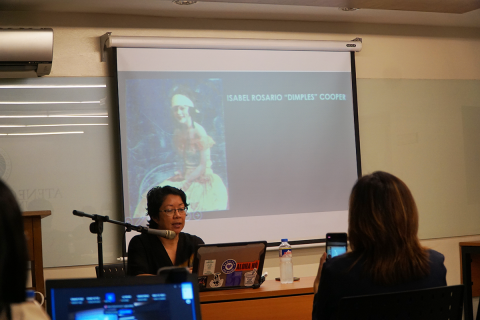
![[AAG] Art Workshops - Cosmic Garden Poster](/sites/default/files/styles/large/public/2025-07/%5BAAG%5D%20Art%20Workshops%20-%20Cosmic%20Garden%20v2.jpg?itok=Z52TVwDS)
